In a recent statement Joseph Shaw, chairman of the Latin Mass Society, said, when referring to the celebration of Mass post-Vatican II, that "arbitrary deformations of the liturgy" (a phrase used by the Pope in his letter accompanying Summorum Pontificum) "have driven most (italics mine) of his contemporaries away from the practice of the faith; he was born in 1971.
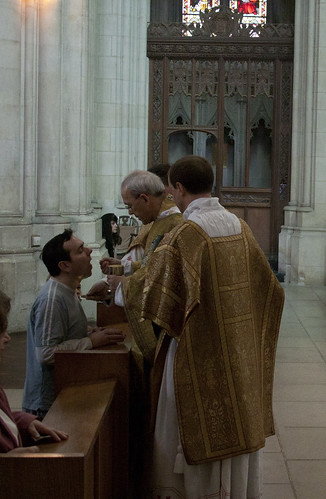
[Bishop Athanasius Schneider distributing Communion at a Pontifical Mass at the LMS Downside Training Conference]
...I much prefer the Ordinary Form of the Mass for a number of reasons; principally the vernacular and the logical way in which the Scripture readings in Mass relate to each other. However, if I were only able to attend the usus antiquior I would do so. To state the obvious, the Sacrifice of the Mass and the partaking of Jesus's body and blood is the same irrespective of the Liturgy with which it is celebrated.
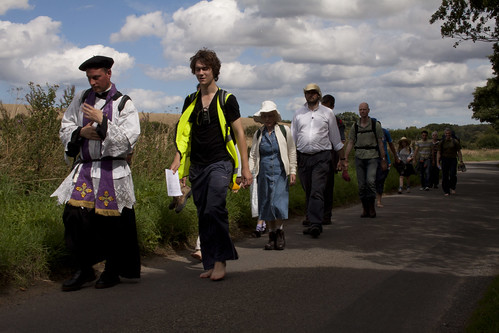
[Pilgrims on the Holy Mile to the Catholic Shrine at Walsingham, having walked 50 miles from Ely on the LMS Pilgrimage.]
If people cease to practice the faith because of their liturgical preferences and I, like Stuart Reid, find this incredible, then the situation is truly alarming. It indicates an urgent need for effective catechesis in regard to the Mass. To cease to practice the faith on account of liturgical preference is to give the form of the Liturgy a higher priority than actually participating in the Eucharist.
It is hard to know where to start with a letter like this; it contains so many curiosities - including the eccentric capitalisations - and confusions. To start with I didn't say that anyone lapsed because of liturgical preferences - my contemporaries can hardly be said to have had much in the way of preferences, since they were not liturgically informed, and it would have been rare indeed for a person growing up in the 1980s to have experienced the Traditional Mass, let alone to have a serious opinion about it.
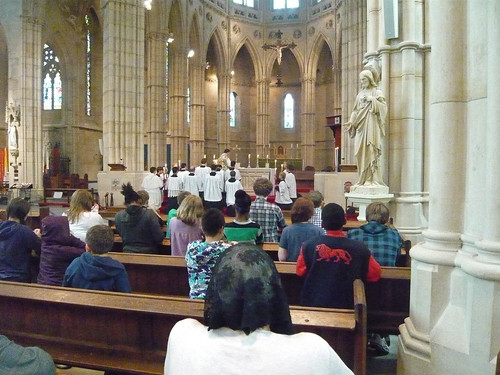
[The St Catherine's Trust Summer School, Missa Cantata at Arundel Cathedral.]
As for there being an 'urgent need for catechesis', I couldn't agree more: the people complaining about the liturgy for the last 40 years have also been complaining about the disastrous state of catechesis, which is indeed another reason for the high levels of lapsation. But Mr Tiley refers to this problem almost as if it were the fault of the children that they were not catechised, like a parent castigating his child for being spoilt. Well, whose fault was that?
However, I responded to a different aspect of his letter, in a letter published in the current edition:
Bernard Tiley (Letters, August 13th), quotes my reiteration of the Holy Father’s point (from the letter accompanying his motu proprio Summorum Pontificum): ‘I have seen how arbitrary deformations of the liturgy caused deep pain to individuals totally rooted in the faith of the Church.’
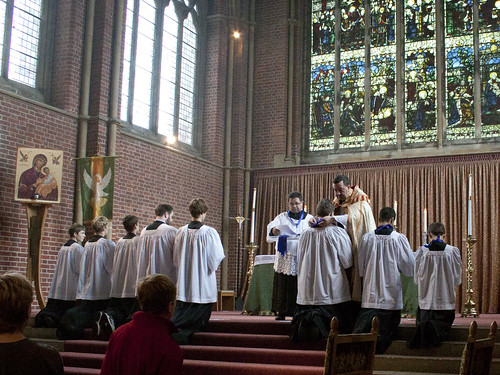
[Servers being enrolled in the LMS-sponsored Society of St Tarcisius, a guild of traditional altar servers, at the SCT Summer School.]
In a remarkable example of the ‘blame the victim’ syndrome Mr Tiley (who also finds the situation ‘incredible’) accuses these individuals of ‘giving the form of the liturgy a higher priority than actually participating in the Eucharist’. Certainly, wilfully to cease practicing the faith for any reason is a sin, but this sin is on the conscience not only of the ones who lapse from the faith but also of those who give occasion for lapsation. To watch two generations of Catholics lapse, at least in part because the fullness of the faith is no longer presented in a compelling way, or at all, in typical parish liturgies, and to react by washing one’s hands of them as insufficiently catechised, seems to me a pretty callous exercise.
Is Mr Tiley seriously suggesting that the Church’s job is to make it as hard as possible to get to heaven, so only those who really deserve it will make the grade? Would it not be better to take account of human frailty, and celebrate the liturgy in forms which give the most spiritual nourishment to participants? With this in mind, it is surely time, as the Holy Father indicates, to encourage more frequent celebration of the Traditional Mass, and to cease the liturgical abuses which disfigure so many celebrations of the Mass of Paul VI.
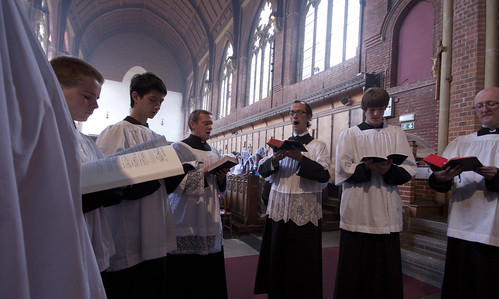
[Pupils and teachers singing Gregorian Chant at the SCT Summer School.]
I can't help wondering what is going through the mind of a man like this Mr Tiley: what is the Church about? He speaks of the reality of the Blessed Sacrament, but it is almost as though he wanted to keep it for himself, or at least for a small elite. The wider population is not good enough, and probably never will be.
But what is even more remarkable is that he, and others like him, have starting arguing in favour of the Novus Ordo Mass in spite of its pastoral deficiencies. He seems to be conceding the point that the Traditional Mass may be better at forestalling lapsation, but trying to persuade us that this is irrelevant. Well, it is certainly not the first object of the liturgy, which is the worship of God. But the whole point and justification of the post-Consiliar reform of the liturgy was pastoral - even the theological issues behind some of the changes were influenced by pastoral considerations. Having the Mass in the vernacular, being able to see the actions of the priest more clearly, etc. etc. were supposed to make it more attractive and more didactically effective. Playing down the metaphysical realities, grace, sin, death, miracles and the saints, was supposed to make the Faith easier to swallow.
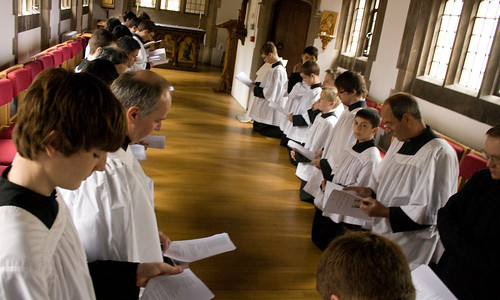
[Inaugral meeting of the Society of St Tarcisius at Blackfriars, Oxford.]
But it turns out the that Novus Ordo has been a failure, from a pastoral point of view. Rather than saying: 'Well, we tested that hypothesis to destruction, let's try something else' the supporters of the post-Conciliar liturgy seem to be saying that we should ignore the pastoral consequences.
This is a common problem with discussions about the Church's pastoral practices since the Council. Things which have been tried as policies on the basis of prudential judgements have been elevated to the level of doctrines which have to be upheld by Catholics as articles of faith. The way this has been done with Ecumenism was brilliantly treated not long ago by Dr Thomas Pink, in an article which aroused much comment at the time it came out, and which is still well worth reading.

[A Traditional Sung Mass in the presence of the Relics of St Therese, the Oxford Oratory.]
For forty years we have been told that the Novus Ordo must be accepted because it is going to make the Faith vivid and attractive. Now people are coming to accept that the Traditional Mass can make the Faith more vivid and attractive: the boot is on the other foot.
No comments:
Post a Comment